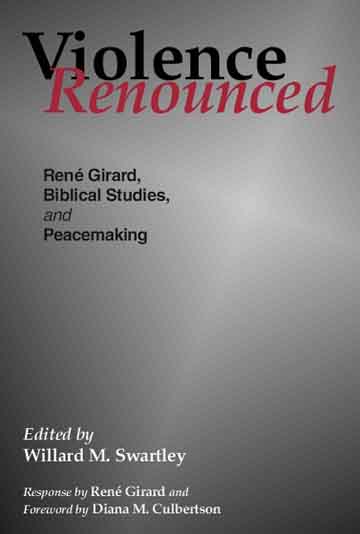|
|||||||
"In reading this rich collection of essays we are privileged to witness a vigorous exchange between spirited scribes and René Girard. His work has challenged them to grapple in a most fundamental way with the relationship between violence, religion, the God of the Bible, and the death of his Christ." —Tom Yoder Neufeld, Associate Professor of Biblical, Peace, and Conflict Studies, Conrad Grebel College/University of Waterloo "This is scholarship at its best: taking theory seriously and exploring the implications. Girard in his notable concluding response emphasizes again the urgency that violence poses not only for scholars but for ‘the whole global culture in which we live.’" —John A. Lapp, Executive Secretary Emeritus, Mennonite Central Committee "Attesting to the maturation of reflection on the work of René Girard over the past decade, this compelling and well-crafted volume is a substantive contribution to Girard scholarship. Readers newly acquainted with Girard an well as those long steeped in his thought will find much to ponder here. A notable achievement!" —Martha J. Reineke, Professor of Religion, University of Northern Iowa "This book is a cornucopia of insight—the fruit of theological reflection and the grist for creative imaginings. Beyond a significant contribution to Girardian studies of mimetic phenomena, it holds its own theologically and includes much to make the discerning reader a better person." —Vern Neufeld Redekop, President, Canadian Institute for Conflict Resolution, Saint Paul, University of Ottawa Summary: What are the roots of human violence? Many theses seek to explain societal rivalry, injustice, and scapegoating. Perhaps none is more thorough or persuasive than Rene Girard's. Yet do his theories on imitation, rivalry, violence, sacrifice, and religion find support in Scripture? These scholarly essays engage this question at multiple levels. Especially Girard's theories on sacrifice and imitation are critically examined in these significant contributions to Girardian scholarshipwhich culminate in a response by Girard himself. Addressed as well in Violence Renounced are kingship and sevanthood, the relation between the Testaments on sacrifice and atonement, and such basic themes as the human primal nature, the shape of new creation in Jewish and Christian reality, and feminist perspectives on Girardian theory. Also seen in new light are standard beliefs and doctrines on atonement, who/what killed Jesus, and how peace is to be rightly achieved. Classification: René Girard; Peacemaking, nonviolence; Scapegoating; Biblical studies; Feminist theory; Conflict resolution, management, or transformation. BISAC: Religion, Psychology, Social Sciences. RTM: 501 Folklore/Mythology, 670 Psychology, 690 Religion/Ethics. The Editor: Willard Swartley, Elkhart, Indiana, is professor of New Testament, Associated Mennonite Biblical Seminary. He earned his Ph.D. from Princeton Theoligcal Seminary. A well-known Bible teacher in churchwide conference settings, he has special interest in the Gospels and in the Bible's peace teaching. He has written four books, including Slavery, Sabbath, War and Women, and edited 14, including Love of Enemy and Nonretaliation in the New Testament. The Contributors: Diana M. Culbertson, Marlin E. Miller, Ted Grimsrud, Charles Mabee, Gordon H. Matties, Michael Hardin, Loren L. Johns, Paul Keim, James G. Williams, Sandor Goodhart, Willard M. Swartley, Robin Collins, Rebecca Adams, Jim Fodor, and René Girard. Publisher: Pandora
Press U.S. (copublished and codistributed by Herald
Press) Violence Renounced orders:
|
|||||||
| Click here to join a Pandora Press U.S. e-mail list and receive occasional updates. | |||||||
